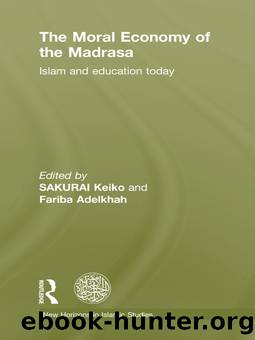The Moral Economy of the Madrasa by Sakurai Keiko;Adelkhah Fariba;Eickelman Dale F.;

Author:Sakurai, Keiko;Adelkhah, Fariba;Eickelman, Dale F.;
Language: eng
Format: epub
Publisher: Taylor & Francis Group
Published: 2011-09-15T00:00:00+00:00
Conclusion
In this chapter, I have sought to illuminate how madrasas and their custodians are fraught with competing doctrinal orientations to Islam, ideas, conceptions and contentions. Considering the case of the Brahmanbaria municipality, this study explicates that the madrasas in contemporary Bangladesh share historically the different interpretative traditions, that is, maslaki traditions of Sunni Islam, originating in nineteenth and twentieth century South Asia. In varied circumstances, the contestation among different madrasa systems is not enlivened by the inclination to different Islamic denominational orientations and the manner in which such orientations are accentuated within the realm of madrasas. The contestation is conjoined with the techniques of social contention by which certain theological interpretations of Islam struggle for social legitimization in the sphere of Muslim cultural tradition. In that sense, the madrasasâ functionality in Bangladesh is not only delimited to its existence as a social or spiritual entity which provides education with religious morality to the Muslims (Bano, 2007); rather, it is a primary site for facilitating and generating the internal reasoning, debates and contestation within Islam in a discursive manner wherein both religious and social issues intricately interplay in refashioning the larger context of Muslim cultural tradition. What follows from this is that madrasas promotes certain denominational aspects of Islam (such as Deobandi, Barelvi) as a way of guiding Muslim identity. I have shown in the above discussion that for many religious and learned Muslims or in a more generic senseâulamaâmadrasas are those places where they can resuscitate the ways of being âMuslim,â even though being a proper âMuslimâ is equivocal and contentious in terms of doctrinal inclination, social and behavioral etiquette. In equating Islamic religious education with the necessity of forming Muslim selfhood and identity, both the custodians of state-approved (Aliya) and non-state (Quomi) madrasas disparage each other on the question of pedagogical methodology that is germane to the process of constructing virtuous and devout Muslims. What follows from this, as I have argued, is that pedagogical exclusivity is not only associated ineluctably with the process of formation of âproperâ Muslim selfhood. It also seemingly associated to the other techniques of powerâsuch as the ulamaâs individual fame and scholarly religious authority, social and religious networking and the discursive nature of madrasa-related religious forums. These techniques generate the contestation with regard to the formation of Muslim selfhood and simultaneously function as facilitators for securing the authorizing realm of social and religious space for many madrasa custodians. Through this contestation certain discourses of being âMuslimâ are not only given more weight over others but also permit the madrasa-educated Muslims in Bangladesh to relocate their social existence using their religious dexterity that is undervalued in the public space.
Download
This site does not store any files on its server. We only index and link to content provided by other sites. Please contact the content providers to delete copyright contents if any and email us, we'll remove relevant links or contents immediately.
Nudge - Improving Decisions about Health, Wealth, and Happiness by Thaler Sunstein(7693)
The Fire Next Time by James Baldwin(5431)
iGen by Jean M. Twenge(5408)
Adulting by Kelly Williams Brown(4566)
The Sports Rules Book by Human Kinetics(4379)
The Hacking of the American Mind by Robert H. Lustig(4375)
The Ethical Slut by Janet W. Hardy(4242)
Captivate by Vanessa Van Edwards(3838)
Mummy Knew by Lisa James(3686)
In a Sunburned Country by Bill Bryson(3537)
The Worm at the Core by Sheldon Solomon(3486)
Ants Among Elephants by Sujatha Gidla(3461)
The 48 laws of power by Robert Greene & Joost Elffers(3249)
Suicide: A Study in Sociology by Emile Durkheim(3018)
The Slow Fix: Solve Problems, Work Smarter, and Live Better In a World Addicted to Speed by Carl Honore(3007)
The Tipping Point by Malcolm Gladwell(2914)
Humans of New York by Brandon Stanton(2868)
Handbook of Forensic Sociology and Psychology by Stephen J. Morewitz & Mark L. Goldstein(2704)
The Happy Hooker by Xaviera Hollander(2686)
